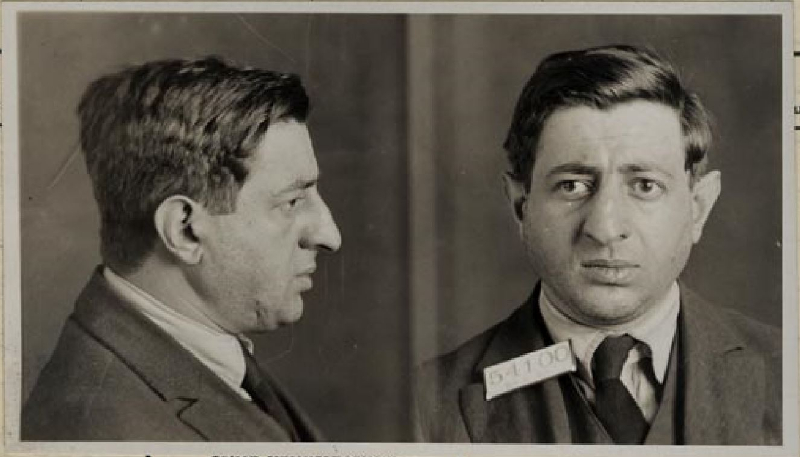This is the latest entry in a series of posts highlighting inmate photographs in the records of the Virginia Penitentiary. Michael Bertone, the subject of this week’s post, was a member of a gang of yeggmen who robbed the Sussex and Surry Bank in Wakefield in 1921.
Early on Sunday, 6 February 1921, four men entered the Sussex and Surry Bank in Wakefield through a window. At about 2 AM, an explosion blew off the door to the vault. The bank robbers looted approximately $30,000 worth of Liberty Bonds and War Savings Stamps from the safety deposit boxes. They left by the back door and drove off in a stolen car. The vehicle, along with $1,800 of Liberty Bonds, was recovered in Petersburg the next day. The police had no witnesses or suspects.
The first break in the case occurred in July 1921. Harry Young, James Powers, alias “Hooligan Joe,” John Hall alias “Jingle Jerry,” and Mike Benton alias Michael Bertone, were arrested near Clarksburg, West Virginia. The four were charged with attempted train robbery. The thieves had removed the switch lights in an attempt to wreck the train and rob the express car. In November 1921, United States Post Office inspectors connected the four to the Wakefield Bank robbery.
During their January 1922 term, the Sussex County grand jury indicted Powers, Hall, Bertone, and a man named “Lone Billy” for robbery.
Michael Bertone, the son of Russian Jewish immigrants, was born on 15 December 1890 in New York City. Prior to the Wakefield robbery, Bertone, using the alias Harry Bressler, lived in Bridgeport, Connecticut with his wife and son while he worked as a tailor. Sometime after Bertone’s arrest in West Virginia in 1921 and indictment in Virginia in 1922, he was transported to Brooklyn, New York. Sussex County Commonwealth’s Attorney Thomas H. Howerton began extradition proceedings in late July 1922. Getting Bertone back to Virginia was not easy.
In early August 1922, Howerton and Sussex County Deputy Sheriff Harry Harris left for Brooklyn with an extradition order for Bertone. They returned to Virginia on 9 August without him. Bertone’s lawyer filed a writ of habeas corpus with the New York Supreme Court which stated that Bertone had never been in Virginia and knew nothing about the Sussex and Surry Bank robbery. In order to extradite Bertone, Virginia officials had to appear at a 15 August hearing in Brooklyn and bring witnesses to show that he was in the vicinity of Wakefield at the time of the robbery. At the hearing, the judge ruled in favor of Virginia; Bertone would be turned over to Virginia officials on 23 August. Howerton, not taking any chances, requested that Governor E. Lee Trinkle authorize and pay for two men to bring him back from Brooklyn, rather than the usual one. “This is a desperate man,” Howerton wrote Governor Trinkle on 18 August. He called Bertone an “outlaw and a professional bank robber and safe blower” who had “defied and beaten up several officers in the course of his arrest.” Bertone was successfully returned to Virginia although it is unknown if Howerton’s request for an extra guard was granted
The case of the Commonwealth vs. Michael Bertone, alias Harry Bressler, alias “Hooks,” commenced in Sussex County on 15 November 1922. After a three day trial, the jury found Bertone guilty of housebreaking and sentenced him to five years in the Virginia Penitentiary. Bertone arrived at the penitentiary on 6 January 1923; he was discharged on 23 April 1926 with time off for good behavior. However, Bertone was not a free man. He was detained in the Sussex County jail to be tried for the theft of the automobile used during the robbery. Bertone, advised by his lawyers that he would get a suspended sentence, plead guilty and received a one year sentence. Under Virginia law, the judge could not suspend the sentence. When Commonwealth’s Attorney Howerton informed the judge that $1,800 worth of Liberty Bonds were found in the car, he added an additional year. Bertone returned to the penitentiary on 23 September 1926.
In April 1927, Bertone filed a petition for a conditional pardon with Governor Harry Byrd. He argued that he was a model prisoner and had served nearly all of his entire original five year sentence. Byrd wrote Virginia Penitentiary Superintendent R.M. Youell for his opinion of the convict. Youell replied on 21 May 1927, acknowledging that Bertone “has not given any trouble and has a good record during both of the sentences.” He added:
As to how genuine his reformation is, of course, problematical. I believe previous to his sentence to the Penitentiary he had associated with a rather crooked bunch of people and he seems to make friends with men of the professional criminal type here in the Penitentiary more than other prisoners. As stated above, his work conduct during both sentences have been good and he might upon being released not give further trouble, but I hesitate to state that I think he would not be involved in any more trouble.
Governor Byrd took no action on Bertone’s clemency petition. A comment in Bertone’s entry in the prison register states why. Bertone was “not to be tried for a second conviction, crime committed previous to first conviction.” He was discharged on 19 October 1927.
Superintendent Youell’s instincts about Bertone were correct. Harry Bressler, alias Michael Bertone, was arrested in Brooklyn on 25 April 1933 for robbing a safe. On 22 June 1933, Michael Baron, alias Harry Bressler, alias Michael Bertone, was arrested for highway robbery in Colonie, New York. He was convicted in Albany County Court on 3 November 1933 and sentenced to 30 years in Clinton Prison. There is no record of any of the other indicted suspects in the Surry and Sussex Bank robbery ever being extradited or tried in Virginia for their role in the crime.
-Roger Christman, Senior State Records Archivist






































